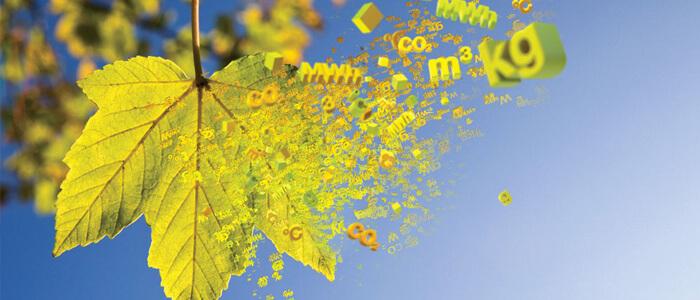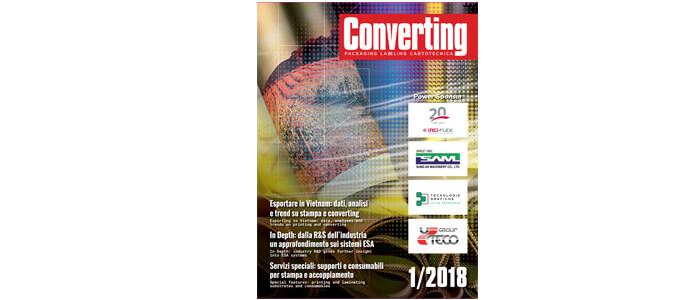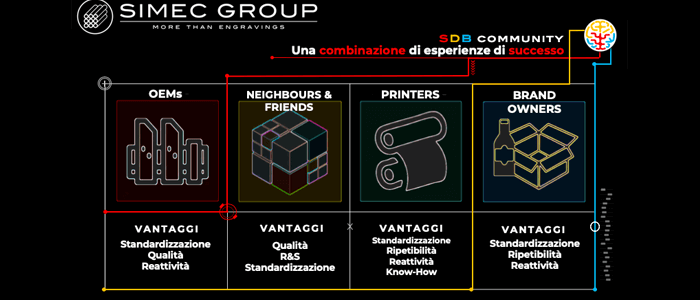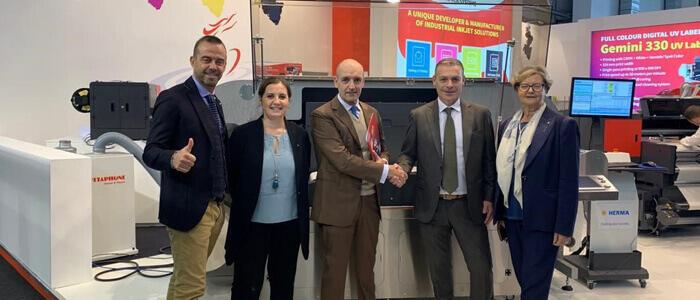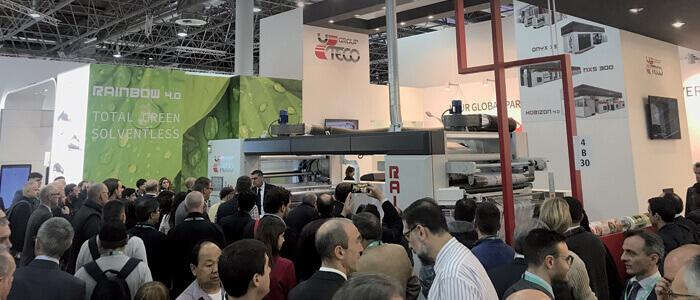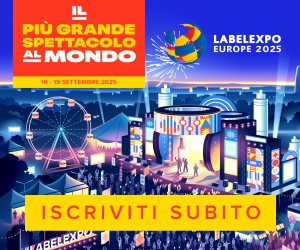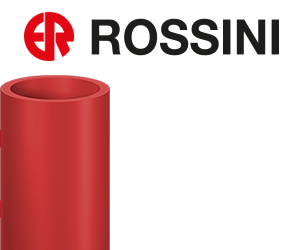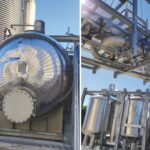More than 9 out of 10 Italian consumers (94% of the sample involved) think that the Government should oblige – by law – companies to declare the level of eco-compatibility of the packaging of their products. The same percentage believes that packaging should contain information on the sustainability of the materials it is made of. Moreover, 9 out of 10 Italians prefer easily recyclable packaging and, passing to behaviour, almost half of the respondents reduced the purchase of products packaged with non-recyclable materials, with a prevalence of critical awareness in the over 50s (but on going from theory to practice it is the Millennials who make the difference). These are some of the results of the umpteenth survey, in this case carried out for Procarton, on 7,000 European consumers from 7 different countries. The same survey, to quote a sensitive topic, which documents consumers’ preference (at 89%) for cardboard as opposed to plastic packaging. Surveys, we know (it is one of the aspects of democracy) work in support of ideas, hence one finds all kinds of opinions and inclinations. One thing, however, is undeniable: today pollution, in a broad sense, is considered a big problem that needs to be faced with facts… So much so that the highly pragmatic consumer goods companies are publishing declarations of commitment involving the entire supply chain upstream and downstream in order to implement them. And if infamous plastic is the first to be incriminated, all the materials in the field, in all the stages of a packaging’s lifecycle are involved, from the cradle to the cradle, passing by way of a grave from which they rise to be recycled, first and foremost mechanically, but perhaps also chemically, to cite a new frontier on which attention is alive.
We present a selection of recent, innovative solutions implemented in the flexible packaging and converting community. They document how, at this moment in time, R&D is moving in all directions and at all levels of packaging production: substrates, inks, adhesives, printing processes, lamination and, of course, recycling.
[su_box title=”Choose what you want to read” style=”glass” box_color=”#e6000a” radius=”5″]
[su_list icon=”icon: envira” icon_color=”#3c5f3e”]
- Compostable packaging inks by Sun Chemical
- A new family of adhesives with vegetable resins by Fraunhofer Institute
- “Water lamination” for tissue by Futura
- A new PP recycling process by PureCycle technologies
- Focus on paper for Sitma Machinery
- Less energy for drying by Xeikon
- Health-enthusiasts! The vegan label is coming! by Sales
[/su_list]
[/su_box]
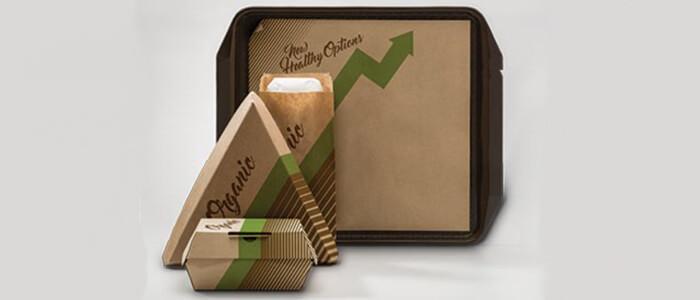 A printed packaging is compostable if the material (substrate) that comprises the same is compostable, while the ink forms a very thin layer, which has very little effect on the degradation process. However, its use is subject to some limitations. Sun Chemical’s contribution and products “OK compost”.
A printed packaging is compostable if the material (substrate) that comprises the same is compostable, while the ink forms a very thin layer, which has very little effect on the degradation process. However, its use is subject to some limitations. Sun Chemical’s contribution and products “OK compost”.
For compostable packaging, bioplastics or papers with suitable certifications are used. Since the inks are not compostable, those suitable for printing compostable packaging are applied according to certain limitations: – each individual ink can be printed up to a limit value on the total weight of the packaging (less than or equal to 1%); – all the inks taken together can be printed up to an overall limit value of the packaging (equalling 5%). Furthehrmore, it is necessary to evaluate the absence or minimum content of certain substances during the formulation of the inks: – heavy metals: absence or slight traces; – volatile organic compounds (VOC): reduced quantity; – voxins banned by EPA (Environmental Protection Agency-USA): absence of Mercury, Polychlorobiphenyl (PCB) and Chlorofluorocarbons (CFC). In turn, the components of the inks, pigments, resins and additives are chosen according to their tendency to deteriorate. Pigments are degradable in a long time (organic pigments) or they are not degradable (inorganic pigments). Pigments are used in packaging inks that do not have negative consequences for the environment (for example, they do not contain copper in their chemical structure). Resins and additives degrade according to their chemical nature. Easy to dissolve resins and additives are used in compostable packaging inks. Sun Chemical has formulated various series of water- based and solvent-based inks that have been certified as Vincotte-TUV for use on ‘OK compost’; packaging. They are series suitable for compostability according to EN 13432: 2000. Series of water-based inks Aquatene BIO1 Inks for flexographic printing of compostable films, that effectively adhere to the supports and have good printability. Aquathene Inks for flexographic printing of high and low density polyethylene (with corona treatment of at least 38-40 dyne/cm), flexible films and paper. The printed matter has suitable adhesion characteristics on plastic substrates and resistance to humidity. Aquapak MX Inks for printing corrugated cardboard, which allow good print coverage to be obtained on kraft and absorbent covers in general. They have good machine stability enabling easy washing of the rollers. Aquapak VFD Gloss inks for printing paper and cardboard, suitable for semi-coated and coated papers. They are characterized by their high drying speed and ensure good resistance to dry dusting and scratches. Series of solvent inks Solimax P Nitrocellulosic roto-flexographic solvent-based ink suitable for printing various plastic films intended for both external printing and lamination with adhesives. The inks of this series are suitable for pasteurization, with heat treatment 60 – 90 ° C, 1 atm, 30° Soliprop V Solvent based nitrocellulosic roto-flexographic ink for polyolefin films for external printing and lamination with adhesives. Solvaplast T Nitrocellulosic flexographic ink with a solvent base suitable for printing exterior of polyolefin films. The series presents good printability, good gloss and excellent mechanical strength, high resistance to dry dusting and scratches.
A new family of adhesives with vegetable resins
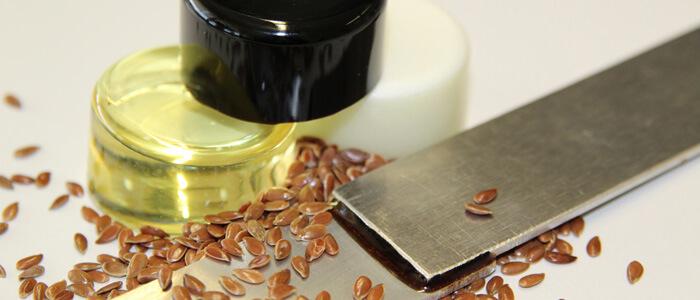 The German research institute Fraunhofer has developed a new type of solvent free adhesive based on epoxy resins made from vegetable oils with a high rate of unsaturated fatty acids. These acids are epoxidized, that is connected with a trivalent compound made of two carbon atoms and one of oxygen; combined with hardeners they create extraordinarily resilient plastics. However, the chemical composition of the raw materials extracted from the seeds of oil plants can vary greatly. The researchers of the Fraunhofer Institute IMWS are identifying the significant variants, to intervene on the formula and thus guarantee the optimal processability of the adhesive. The research also includes the fillers and additives used to obtain specific properties such as, for example, the electrical conductivity that facilitates curing, or additives (for example thyme oil) with antibacterial properties. The adoption of vegetable epoxy oils increases the “naturalness” rate of the new adhesives 86%; a reminder that, to be qualified as “sustainable”, a material must obtain at least 35% of its ingredients from renewable sources. In developing the new adhesives, the researchers abandoned epoxidation in favor of a new treatment based on enzymes, which allows vegetable oils to be processed without using petrochemical substances. The treatment in question takes place at 40 degrees Celsius instead of the established 100 degrees, thus also achieving energy savings. Lastly, the raw materials to produce the new adhesives must no longer be imported from Canada but are available in and around Germany, further reducing the carbon footprint of the production cycle.
The German research institute Fraunhofer has developed a new type of solvent free adhesive based on epoxy resins made from vegetable oils with a high rate of unsaturated fatty acids. These acids are epoxidized, that is connected with a trivalent compound made of two carbon atoms and one of oxygen; combined with hardeners they create extraordinarily resilient plastics. However, the chemical composition of the raw materials extracted from the seeds of oil plants can vary greatly. The researchers of the Fraunhofer Institute IMWS are identifying the significant variants, to intervene on the formula and thus guarantee the optimal processability of the adhesive. The research also includes the fillers and additives used to obtain specific properties such as, for example, the electrical conductivity that facilitates curing, or additives (for example thyme oil) with antibacterial properties. The adoption of vegetable epoxy oils increases the “naturalness” rate of the new adhesives 86%; a reminder that, to be qualified as “sustainable”, a material must obtain at least 35% of its ingredients from renewable sources. In developing the new adhesives, the researchers abandoned epoxidation in favor of a new treatment based on enzymes, which allows vegetable oils to be processed without using petrochemical substances. The treatment in question takes place at 40 degrees Celsius instead of the established 100 degrees, thus also achieving energy savings. Lastly, the raw materials to produce the new adhesives must no longer be imported from Canada but are available in and around Germany, further reducing the carbon footprint of the production cycle.
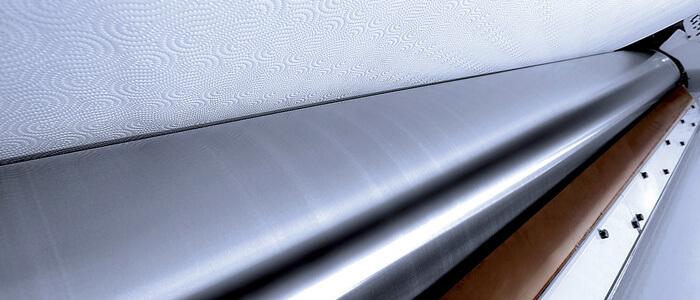 JOI Hydro-Bond is a new technology from Futura (Faper Group, Perini) that allows the perfect adhesion of tissue plies that make up the roll of toilet paper and similar products, only using water, without the addition of glue. The end result is a more hygienic, soft and sustainable product, both from an environmental and an economic point of view. «The perfect adhesion of the plies is determined by our “Zero Deflexion” steel marrying roll- declares Futura’s technology head, Giovacchino Giurlani – that, by compressing the fibres perfectly and homogeneously over the entire surface, manages to exploit the “adhesive power” of water to create a permanent bond between the plies». According to the Lucca-based company, the glue-free lamination process ensures greater performance as it reduces dirt in the machine and related cleaning operations, as well as the risk of production stoppage. JOI Hydro-Bond has been tested in real operating situations, using a wide variety of hygienic, conventional and structured papers. And, thanks to the collaboration of some users, Futura has verified the production process both hot and humid as well as cold and dry climatic conditions, also testing the different qualities of water available. All trials also confirmed the good performance with 3 and 4-ply paper.
JOI Hydro-Bond is a new technology from Futura (Faper Group, Perini) that allows the perfect adhesion of tissue plies that make up the roll of toilet paper and similar products, only using water, without the addition of glue. The end result is a more hygienic, soft and sustainable product, both from an environmental and an economic point of view. «The perfect adhesion of the plies is determined by our “Zero Deflexion” steel marrying roll- declares Futura’s technology head, Giovacchino Giurlani – that, by compressing the fibres perfectly and homogeneously over the entire surface, manages to exploit the “adhesive power” of water to create a permanent bond between the plies». According to the Lucca-based company, the glue-free lamination process ensures greater performance as it reduces dirt in the machine and related cleaning operations, as well as the risk of production stoppage. JOI Hydro-Bond has been tested in real operating situations, using a wide variety of hygienic, conventional and structured papers. And, thanks to the collaboration of some users, Futura has verified the production process both hot and humid as well as cold and dry climatic conditions, also testing the different qualities of water available. All trials also confirmed the good performance with 3 and 4-ply paper.
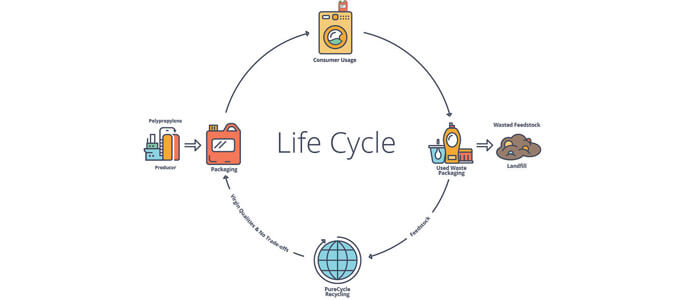 PureCycle Technologies (Innventure, Wasson Enterprise Partnership) is announcing it has partnered with Milliken (chemical additives and dyes) and Nestlé SA, to accelerate the innovative process developed for PP recycling. The process, patented by PureCycle, developed and licensed by Procter & Gamble, separates color, odor and other contaminants from plastic waste feedstock, to transform it into resins with the same properties as virgin material, thus offering an alternative to mechanical and chemical recycling. Milliken supplies the additives that enable the creation of recycled PP; in turn, Nestlé is working with PureCycle to develop new, more sustainable materials, in line with the commitment to make 100% of its packaging recyclable or reusable by 2025. PureCycle is building the first recycled plastic generation facility in Lawrence County (Ohio, USA), with a capacity of 119 million pounds of PP per year (about 54 million kg) and a recycling plan of over 105 million pounds (over 47.6 million kg) starting in 2021. It also plans to open a feedstock evaluation unit for the many variations of waste material, to optimize the selection and recycling operations. To date, less than 1% of the PP used in the packaging and consumer goods industry is recycled, compared to 20% of PET.
PureCycle Technologies (Innventure, Wasson Enterprise Partnership) is announcing it has partnered with Milliken (chemical additives and dyes) and Nestlé SA, to accelerate the innovative process developed for PP recycling. The process, patented by PureCycle, developed and licensed by Procter & Gamble, separates color, odor and other contaminants from plastic waste feedstock, to transform it into resins with the same properties as virgin material, thus offering an alternative to mechanical and chemical recycling. Milliken supplies the additives that enable the creation of recycled PP; in turn, Nestlé is working with PureCycle to develop new, more sustainable materials, in line with the commitment to make 100% of its packaging recyclable or reusable by 2025. PureCycle is building the first recycled plastic generation facility in Lawrence County (Ohio, USA), with a capacity of 119 million pounds of PP per year (about 54 million kg) and a recycling plan of over 105 million pounds (over 47.6 million kg) starting in 2021. It also plans to open a feedstock evaluation unit for the many variations of waste material, to optimize the selection and recycling operations. To date, less than 1% of the PP used in the packaging and consumer goods industry is recycled, compared to 20% of PET.
Sitma Machinery is focusing on paper
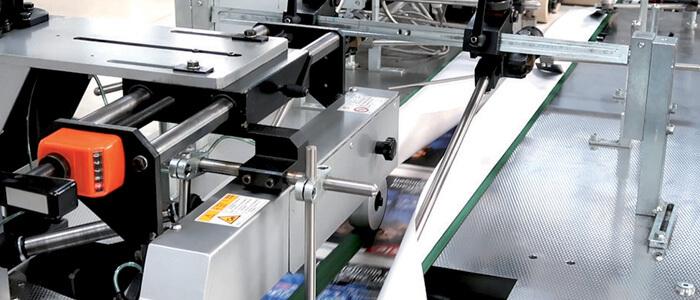 Sitma Machinery (design and construction of machines, systems and complete lines for packaging, post-press, DM/transpromo and e-logistics) strengthens its commitment to eco-sustainable technologies. Extensive investments in the search for an alternative to packaging with traditional thermoplastic materials, starting from the comparative study of paper and bio-plastics, have led to paper as a preferred alternative, above all for its fast biodegradability and renewability at source. The company from Spilamberto (MO) has adapted its machines accordingly, developing a process that allows the packaging of objects of different sizes on the same machine using cellulosic-based materials. Thanks to the retrofit devised by Sitma, in most cases the use of paper does not require changing the machine or production line, and guarantees a packaging quality comparable with that of packaging with film in terms of protection, aesthetic requirements and opportunities for customization. Sitma’s technology is also in line with the regulations to reduce the carbon footprint with a Product Lifecycle Management approach that controls emissions, from the procurement of raw materials right up to the disposal of the line. The ultimate goal – Carbon Neutrality Certification.
Sitma Machinery (design and construction of machines, systems and complete lines for packaging, post-press, DM/transpromo and e-logistics) strengthens its commitment to eco-sustainable technologies. Extensive investments in the search for an alternative to packaging with traditional thermoplastic materials, starting from the comparative study of paper and bio-plastics, have led to paper as a preferred alternative, above all for its fast biodegradability and renewability at source. The company from Spilamberto (MO) has adapted its machines accordingly, developing a process that allows the packaging of objects of different sizes on the same machine using cellulosic-based materials. Thanks to the retrofit devised by Sitma, in most cases the use of paper does not require changing the machine or production line, and guarantees a packaging quality comparable with that of packaging with film in terms of protection, aesthetic requirements and opportunities for customization. Sitma’s technology is also in line with the regulations to reduce the carbon footprint with a Product Lifecycle Management approach that controls emissions, from the procurement of raw materials right up to the disposal of the line. The ultimate goal – Carbon Neutrality Certification.
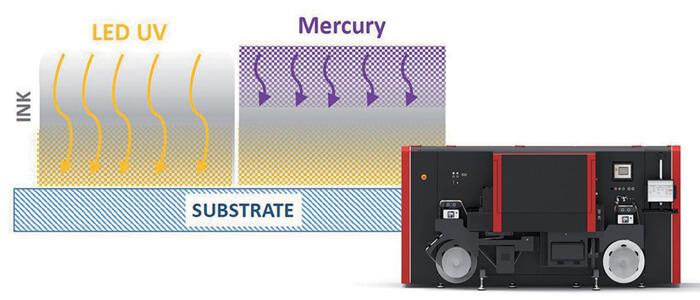 Energy saving is a crucial chapter in the sustainability of industrial processes. To maximize the effectiveness of Xeikon Panther digital UV inkjet printing systems, Xeikon presents Panther DuraCure, a patent-pending drying technology that promises performance, uniformity and durability with minimum energy consumption. Depending on how it is used, it achieves different goals: UV drying of white ink prevents it from being dispersed in CMYK inks; UV drying after black, after the CMYK transfer, “freezes” the colors on the image reaching an optimal brightness and gloss. The association of LED technology with mercury lamps enables less energy consumption and has a positive impact on lamp life.
Energy saving is a crucial chapter in the sustainability of industrial processes. To maximize the effectiveness of Xeikon Panther digital UV inkjet printing systems, Xeikon presents Panther DuraCure, a patent-pending drying technology that promises performance, uniformity and durability with minimum energy consumption. Depending on how it is used, it achieves different goals: UV drying of white ink prevents it from being dispersed in CMYK inks; UV drying after black, after the CMYK transfer, “freezes” the colors on the image reaching an optimal brightness and gloss. The association of LED technology with mercury lamps enables less energy consumption and has a positive impact on lamp life.
Health-enthusiasts! The vegan label is coming!
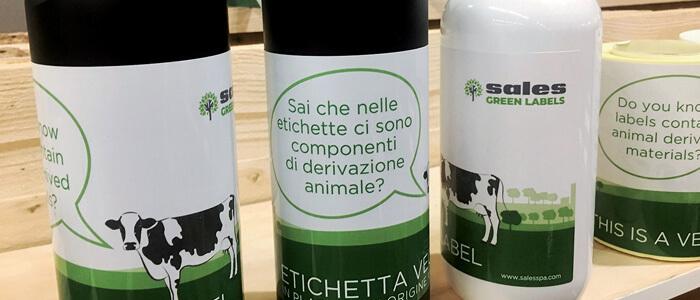 The story is curious and instructive. A foreign customer commissioned Sales (a well-known, internationally certified Piedmontese label maker) to devise a label for a vegan product, specifying that, for consistency, it should not contain any animal derived component. The people at Sales are scrupulous and, in order to offer an absolute guarantee, they conducted a survey with their suppliers, thus discovering that the normally used self-adhesive materials actually contain animal derivatives. The problem gave way to a search for alternatives that have led to adding structures suited to the demand for 100% vegetable products to Sales product offer: “Today – says Domenico Tessera Chiesa, Managing Director of Sales Srl – we have in our portfolio a series of Vegan materials that complete our offer of sustainable solutions. Such as, for example, FSC certified or recycled paper, recycled PET or FSC recycled paper supports, plastic fronts derived from vegetable polymers … We are therefore able to offer innovative, eco-friendly solutions with the fundamental characteristic of every Vegan product: the total absence of animal derived components».
The story is curious and instructive. A foreign customer commissioned Sales (a well-known, internationally certified Piedmontese label maker) to devise a label for a vegan product, specifying that, for consistency, it should not contain any animal derived component. The people at Sales are scrupulous and, in order to offer an absolute guarantee, they conducted a survey with their suppliers, thus discovering that the normally used self-adhesive materials actually contain animal derivatives. The problem gave way to a search for alternatives that have led to adding structures suited to the demand for 100% vegetable products to Sales product offer: “Today – says Domenico Tessera Chiesa, Managing Director of Sales Srl – we have in our portfolio a series of Vegan materials that complete our offer of sustainable solutions. Such as, for example, FSC certified or recycled paper, recycled PET or FSC recycled paper supports, plastic fronts derived from vegetable polymers … We are therefore able to offer innovative, eco-friendly solutions with the fundamental characteristic of every Vegan product: the total absence of animal derived components».

